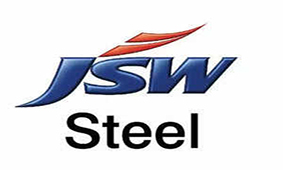
JSW Steel pares output, sales projections for 2019-20

"Muted investment spends, credit squeeze and slowdown in the automotive sector resulted in overall subdued steel demand," said JSW.
JSW now expects crude steel output and steel sales to be lower than earlier targets of 16.95mn t and 16mn t respectively.
The company's crude steel output during the July-September quarter dropped by 8pc from a year earlier to 3.84mn t, while sales dropped by 9pc to 3.6mn t.
JSW Steel expects demand to pick up in the second half of the fiscal year, although it may not be enough to offer lower sales and production volumes in the first half.
A modest recovery in demand is expected on the back of higher consumer spending for the Diwali festival this month and government initiatives to increase credit availability. A better than normal monsoon season bodes well for farm incomes and could lead to increase in rural demand, said JSW. The company expects India's steel demand to rise by 5pc in 2019-20, the same pace at which demand has grown during the April-September period.
Prolonged and severe monsoon rains affected JSW's production, while planned shutdowns also led to loss of output in the July-September quarter. Steel prices were lower on the back of tight liquidity in the economy.
The Argus-assessed Indian domestic HRC price has fallen by 7,000 rupees/t ($98.50/t) since the first week of June to Rs33,500/t ex-Mumbai.
Prices of coated steel 0.5mm thickness with 80 grams/m² zinc coating also dropped by Rs2,000/t to Rs 42,000/t.
JSW reduced capital expenditure (capex) for 2019-20 to Rs110bn by deferring capex of Rs47bn to the following fiscal year. But JSW will continue its main project of doubling capacity of its Dolvi plant on the west coast to 10mn t/yr from its current 5mn t/yr.


Trump weighs using $2 billion in CHIPS Act funding for critical minerals

Codelco cuts 2025 copper forecast after El Teniente mine collapse

Electra converts debt, launches $30M raise to jumpstart stalled cobalt refinery

Barrick’s Reko Diq in line for $410M ADB backing

Abcourt readies Sleeping Giant mill to pour first gold since 2014

Nevada army depot to serve as base for first US strategic minerals stockpile

SQM boosts lithium supply plans as prices flick higher

Viridis unveils 200Mt initial reserve for Brazil rare earth project

Tailings could meet much of US critical mineral demand – study

Kyrgyzstan kicks off underground gold mining at Kumtor

Kyrgyzstan kicks off underground gold mining at Kumtor

KoBold Metals granted lithium exploration rights in Congo

Freeport Indonesia to wrap up Gresik plant repairs by early September

Energy Fuels soars on Vulcan Elements partnership

Northern Dynasty sticks to proposal in battle to lift Pebble mine veto

Giustra-backed mining firm teams up with informal miners in Colombia

Critical Metals signs agreement to supply rare earth to US government-funded facility

China extends rare earth controls to imported material

Galan Lithium proceeds with $13M financing for Argentina project

Kyrgyzstan kicks off underground gold mining at Kumtor

Freeport Indonesia to wrap up Gresik plant repairs by early September

Energy Fuels soars on Vulcan Elements partnership

Northern Dynasty sticks to proposal in battle to lift Pebble mine veto

Giustra-backed mining firm teams up with informal miners in Colombia

Critical Metals signs agreement to supply rare earth to US government-funded facility

China extends rare earth controls to imported material

Galan Lithium proceeds with $13M financing for Argentina project

Silver price touches $39 as market weighs rate cut outlook

















